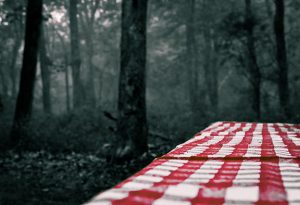“I’ve been feeling somewhat frustrated the past few years,” I said to my imaginary future self Fannie, as I helped her unpack a picnic basket on a cloudy and windy afternoon in July 2083. The corners of our disposable red and white tablecloth fluttered briskly in the breeze. Although the sky had gotten dark enough that a storm surely had to be close by, we didn’t have to worry about losing the tablecloth to a sudden gust because a thin strip of some futuristic temporary adhesive kept it firmly secured to the park table.
(Creative Commons image via flickr)
Sipping her iced tea, Fannie gave a nod of encouragement, waiting for me to go on. I was distracted, however, by a pair of unusually large bluish-green flies that hovered above our tuna sandwiches for a moment before they both flew away.
“They’re harmless,” Fannie informed me in a cheerful tone. “Genetically engineered to eat mosquitoes and other pests, while leaving picnic food alone. Also, they glow in the dark—that gene was inserted to help the biologists track them. They’re really quite pretty on summer evenings. Look, there are more of them glowing under the trees where it’s dark.”
In all honesty, I thought the genetically engineered flies looked a bit creepy; but in the interest of being polite to my future self, I didn’t say so. Instead, I went back to my earlier topic, which had to do with the frustration of trying to imagine my future work in a rapidly changing world.
“My job is comfortable enough,” I said, “and maybe that’s part of the problem. Maybe I’ve been doing the same work for too long. I feel like I ought to have a better sense of what comes next, but I can’t seem to get it clear in my head.”
“Let’s talk about what happened when you first took the job,” Fannie replied, putting down her salad fork. “Did you have any clear future plans then?”
This obviously was a rhetorical question because Fannie, as a future version of me, already knew what had happened. Still, I gave it serious consideration and got my thoughts in order before I answered.
“No, I didn’t really—and that seems strange now, given the fact that I started in a temporary position and had no assurances that it would become permanent. I was mainly focused on the skills that I was learning, and I felt confident that I would be able to use them in a future job, whatever it might be. At the time, I didn’t worry about not having long-term career plans.”
Fannie took a bite of her tuna sandwich and chewed thoughtfully, as the sky grew darker and I heard a faint rumble in the distance. It sounded like thunder; but considering the sci-fi surroundings, I guessed that it might be traffic noise from flying vehicles instead.
“Well, then,” she finally asked, “what changed?”
Several potential answers came to mind before I was able to settle on one. “Mainly my perspective. By now, I’ve seen what can happen to people who wander through life without plans or who get overconfident in their assumptions. A lot of comfortable jobs disappeared during the recession, and the economy still feels shaky—but it’s not just that. With the world changing so fast, I now feel like I could easily miss out on something good because I didn’t know where to look.”
Although a faint pattering of rain had by now started in the nearby trees, our picnic table was still dry. Fannie poured herself a little more iced tea before starting to put away the remnants of our picnic in the basket, which looked like old-fashioned wicker (but a closer inspection showed it was a synthetic material instead).
“To sum up,” Fannie stated in a matter-of-fact tone, “you’ve gained more awareness of possible different outcomes, and you understand that present-day choices have great power to shape your life going forward. But rather than feeling empowered by these insights, you worry about making bad decisions—or failing to make decisions when they’re needed, which amounts to the same thing.”
I nodded, feeling somewhat embarrassed. “Yeah, that’s about right. I guess I’m being kind of silly, when you put it like that.”
“Not at all,” Fannie declared firmly, as she took from her handbag a small item that looked like a key fob and pressed a button on it. “More choices always mean more uncertainty; that’s just the natural way of things. But what usually happens is that although we may feel unsure of our decisions, they end up all right anyway. Even when we think we’ve gotten ourselves into a bad situation, we find that a solution appears.”
The rain was coming down in earnest now, splattering on the now-cleared table. A moment later, I heard a mechanical whirring, and then Fannie’s flying car came into view. Evidently it had been parked somewhere close by. It landed on a concrete pad not far from the picnic table, and Fannie walked briskly toward it while carrying the basket. She winked at me as she got into the car.
“See, things work out—rain or shine. It’s not that hard.”
I started to walk around to the passenger side, thinking that it would be great fun to go for a ride, even in the stormy weather. But alas, that would have to wait for another blog post. Fannie and her surroundings vanished into the mist, and I found myself back in my own time.

